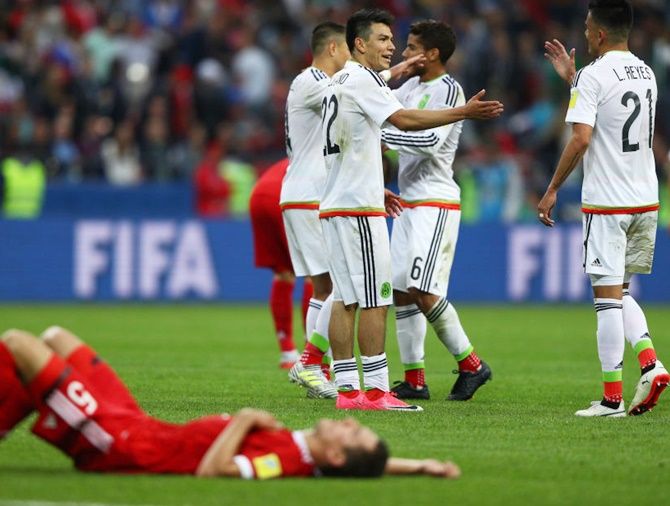News of all that's transpired on and off the football field

FIFA on Monday said the re-laid pitch at the St Petersburg stadium had sustained damage but was being treated before it hosts the final of the Confederations on Sunday.
The 68,000-seat stadium, the home of Russian football powerhouse Zenit, will be a flagship venue at the 2018 World Cup. But the pitch had to be hastily re-laid after it was cut up during the inaugural match there in April.
Prior to the problems with the grass, issues with the stadium's retractable pitch technology also caused the playing surface to vibrate, rendering it unfit for matches.
Colin Smith, director of competitions for global soccer body FIFA, told reporters that the stadium's "young pitch" had sustained damage from the matches, as well as from warm-up sessions.
"We did significant top dressing last night," Smith told reporters at a news conference in St Petersburg.
"Tomorrow we will fully cover the pitch and really regulate the temperature and the growing conditions in there. We're confident that it will be a good playing surface for the final."
Smith said greenhouse structures had been installed over the pitch's weaker areas and grow lights have been permanently set up. He added that rainy weather conditions had "not helped the growth of the problem areas" on the pitch.
Portugal captain Cristiano Ronaldo and coach Fernando Santos both criticized the pitch after their 4-0 win over New Zealand on Saturday, with Ronaldo telling Portuguese media the grass was too long.
Santos said the teams were prevented from training on it the day before the game.
Smith said the group stage of the Confederations Cup had been a great success on the operational level but that there was room for improvement ahead of the knock-out stage, which begins on Wednesday.
"Very importantly, these improvements will also serve as very valuable lessons looking ahead to next year’s FIFA World Cup," he said.
Portugal face Chile in the first semi-final on Wednesday in Kazan, while Germany take on Mexico in Sochi the next day. The winners of the two semi-finals will play for the title on Sunday in Saint Petersburg.
Video assistant referee system needs improvement, says FIFA
The video assistant referee (VAR) technology being tested at the Confederations Cup in Russia should be refined, the head of refereeing at world soccer's governing body FIFA said on Monday.
"In general we have really good results but for sure ... many aspects should be improved," Massimo Busacca told a news conference.
VAR involves two video assistant referees who monitor the action on screens and draw the match referee's attention to officiating mistakes.
FIFA has already said it would like to use video assistant referees at the 2018 World Cup, and soccer's law-making body IFAB is expected to decide next March whether to allow them to become part of the game on a permanent basis.
But their use has caused confusion at the Confederations Cup, especially during Sunday's match between Germany and Cameroon when on-field official Wilmar Roldan needed two reviews of an incident to send off the correct Cameroon player.
Cameroon coach Hugo Broos complained that he did not understand what was going on.
"I have to agree, it was too long... but in the end the right player was sent off," said Busacca.
There was also controversy when a video review denied Chile a legitimate-looking goal in their 2-0 win against Cameroon on June 18, and it was used again at the end of the same match to overturn a linesman's offside call and award Chile a goal
But the main criticisms are the time taken to make decisions and the referees' criteria in deciding when to use the system, with some close calls being made without consulting the VARs.
Busacca accepted that reviews could take the gloss off goal celebrations.
"It can reduce at some moments the enjoyment of football because you have a celebration and then suddenly a review and you have to change -- so people can have to live with this," he said.
In 12 group stage matches at the Confederations Cup, video review helped correct six "game-changing decisions," Busacca said.
Match officials ruled correctly on another 29 "major incidents" with the help of the technology, he added.
"It's important to mention today that clear mistakes were not missed," he said.
Busacca noted that if used correctly, the system could reduce many mistakes but not eliminate them completely. FIFA was keen on convincing member federations to use video review, he added.
Despite the controversy, FIFA President Gianni Infantino said this month he was extremely happy with its use at the tournament.













 © 2025
© 2025